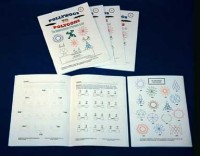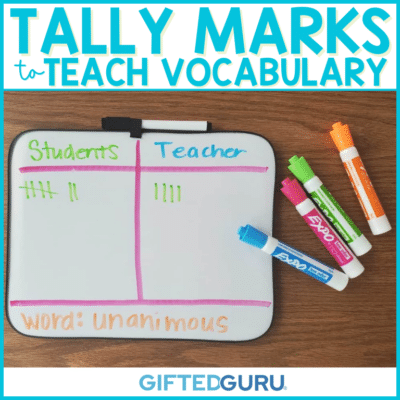Best Practices for Early Finishers
Early finishers can challenge even the best and most experienced teachers. Many of us have had the experience of barely getting the work passed out to everyone before the first Fast Finisher is waving her completed assignment in the air. Really? You’re done already?
In addition to early finishers getting their independent work completed ahead of the rest of the class, we also sometimes have students working in groups who have to wait while the rest of the students finish before they can move on. They love this. No, really, they do. {that was a lie}
I’m sharing best practices for early finishers for teachers (I’ll share ideas for students in a future post).
The Secret is the Planning
The internet is full of early finisher ideas (just Google it – I’ll wait), yet most of them miss the key point: early finishing is a symptom of a bigger issue.
If you have the same early finisher over and over, there’s a planning issue. Remember: differentiated instruction means making sure work is designed to meet the needs of the student.
It’s not moreferentiation – you’re not giving two worksheets instead of one just so everyone’s done on time. The work itself should be more complex, which should take more time.
To oversimplify, part of the class may be working on addition, while the advanced learners (most often the early finishers) have multiplication.
When you’re creating the work, consider whether the work is respectful of the students’ abilities. Can you add challenge to even out the time it takes?
The goal here is not to keep them busy (Oh, who am kidding? That’s part of it.) The goal is to make sure that they are spending the time they have for development of that skill, not just killing time with a cute list of unrelated stuff.
Examples
Here are examples from my classroom:
- Third Grade:
- Most of the class reading simplified version of a myth. Early finishers reading the D’Aulaire version.
- Most of the class practicing spelling words. Early finishers looking through the glossary of an advanced textbook of their interest (science, math, art, etc.) to find words they want to learn.
- Most of the class working on math facts practice. Early finishers working on making art of the math. I love Muggins Math‘s Polywogs to Polygons for this. You can get free samples here. Basically, they’re answering the questions in order to be able to create art out of the answers. I snagged a picture of it from their website below.
- High School:
- Most of the class is writing and revising a paragraph. Early finishers are writing a paragraph imitating the style of a famous author or revising a section of a famous speech.
- Most of the class is reading The Odyssey aloud with me. Early finishers (who do NOT generally like reading aloud with the class) are reading an online version with hypertext to extend their learning.
- Most of the class is creating a PowerPoint on latitude and longitude in groups. Early finishers are working together to create an illustrated e-book on the discovery of longitude that will be uploaded to the internet.
These are just a few examples, but I think you get the point. If teachers plan the same work for different levels of students, they will never solve the timing puzzle.
In case you’re wondering, yes, I’ve taught both high school and elementary school. I like collecting teaching certifications just for fun.
My Issue with Most Early Finisher Stuff
When I poke around the internet looking at ideas for early finishers, almost all of them involve one of the following:
- the student’s doing something that involves practice of things they probably already know (Write your spelling words three times! So fun!)
- the student’s doing something completely unrelated to the task (Finished with your essay? Great! Practice your math facts.)
- materials that are simply generic, and while fun and even educational, are not actually moving that student forward (Go pull a stick from the Done Jar and do what it says, even if you have already mastered that activity!)
{May I just take a moment here for us to pause and appreciate my appropriate use of the possessive in front of the gerund in two of the examples above? Sigh. I just love grammar.}
Other ideas that are no bueno are using early finishers as tutors, having them simply do more of the same work they were already doing, or simply telling them to “look over their answers.”
Some ideas
Even with the best of planning, we’re going to have early finishers. So what are some ideas that are worthwhile? Here are some I like:
- Skill practice like this teacher is doing who printed and laminated paper keyboards for kids to use to practice relevant words.
- Mindware offers free printable samples of most of their books. I especially like the Extreme Dot-to-Dot and Perplexors.
- Games related to the content being learned like this teacher made who set up math games for math practice during math. See the pattern there? I like this as long as there are some that are actually a challenge or stretch, not just more of the same.
- For older students, I like the SAT Question of the Day app.
- When I was at Mensa, I created TED Connections that take TED talks and turn them into self-exploration activities.
- Games like SET (get the online version free every day from the New York Times) that can be played alone that increase critical thinking.
- Interest-based exploration activities, like watching TED talks, reading articles from quality magazines, or completing online tutorials in a skill.
- Independent, long-term projects like writing a novel or creating something.
- Writing a book review (as opposed to a report) that gets put online. I wrote a guide for kids about how to write a book review).
- The best defense against boredom at school for most high ability kids is a book, so help them out by guiding them to quality literature. The Excellence in Reading program offers free printable lists of books banded by grade level. Bonus: if the student reads all of the books on a list, he/she earns a free t-shirt.
- Puzzles, either traditional or things like Sudoku or other math or logic puzzles.
A Few Important Steps
Teachers have to be careful to set expectations ahead of time. We don’t want students rushing through their work just so they can play with the cool extension stuff. Not that they would ever do that.
Build in a classroom version of checks-and-balances to make sure students are creating quality work.
Consider:
- How will students know when they can participate in the early finisher activities?
- How will you know they didn’t just give their work a lick and a promise (as my Grandma would say) in their hurry to get back to their book?
- What are the behavior expectations (not disturbing others? quiet voices? silence?)?
- What will happen if the expectations are violated?
My Read-Ahead Contracts may give you some ideas.
Considerations for Group Work
Early finishers can be a particularly tricky issue when they’re working in groups. What happens when three students are working on something together, and one of them is done and has to just sit there? That’s going to be super fun, for sure.
Here are some ideas:
- Make sure group assignments are differentiated in the same way as individual ones would be.
- Have students flow in and out of the groups, working together sometimes and individually for part of it.
- Use the jigsaw-with-an-expert technique. In this strategy, every student in the group has a role. The group breaks up so that the students work with the students from the other groups that have their same role. They then return to their original group ready to share the work that was done in the role-based groups.
I hope these ideas have helped you. I also tackle what students should do when they find themselves waiting…and waiting…and waiting. Read that article for more ideas!







